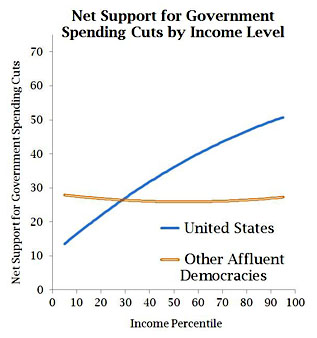Over at the Monkey Cage, Larry Bartels presents the remarkable chart on the right. Its message is simple: In most affluent countries, there’s net support for government spending cuts, but it doesn’t depend much on income. Not only is the level of  support modest, but it’s the same among rich and poor.
support modest, but it’s the same among rich and poor.
But not in America. Here, demand for spending cuts is driven almost entirely by the well-off:
What accounts for the remarkable enthusiasm for government budget-cutting among affluent Americans? Presumably not the sheer magnitude of redistribution in the United States, which is modest by world standards. And presumably not a traditional aversion to government in American political culture, since less affluent Americans are exposed to the same political culture as those who are more prosperous. A more likely suspect is the entanglement of class and race in America, which magnifies aversion to redistribution among many affluent white Americans.
….The U.S. tax system is also quite different from most affluent countries’ in its heavy reliance on progressive income taxes. The political implications of this difference are magnified by the remarkable salience of income taxes in Americans’ thinking about taxes and government….Income taxes seem to dominate public discussion of taxes and tax policy. For example, years of dramatic political confrontation culminated in a grudging agreement to shave a few percentage points off the Bush tax cuts for incomes over $400,000 per year; meanwhile, a major reduction in the payroll taxes paid by millions of ordinary working Americans expired with barely a whimper.
It’s no surprise that spending cuts are popular in other countries: most of them spend a lot of money, and they fund it with high tax rates on just about everyone. But that’s decidedly not the case in the United States. Our government spending is relatively low and so are our tax rates. But none of that matters. Rich Americans don’t like paying taxes, and as we know from multiple lines of research—in addition to plain old common sense—the opinions of the rich are what drive public policy in America. Add in longstanding grievances against providing benefits to people with darker skins, and you’ve got a big chunk of the middle class on your side too. This works great for the rich. For the rest of us, not so much.


















